XXIII Simposio de Literatura Infantil y Juvenil / XXIII Symposium on Children’s and Young Adult Literature
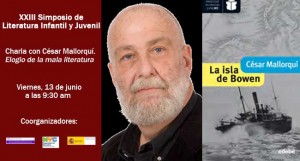
El pasado 13 de junio celebramos en el Instituto Cervantes de Nueva York el XXIII Simposio de Literatura Infantil y Juvenil. En esta edición nuestro invitado de honor fue el escritor César Mallorquí, Premio Nacional de Literatura Juvenil por La isla de Bowen, que nos deleitó con dos conferencias tituladas Elogio de la mala literatura y En la mente del escritor. El aforo estaba completo y aprendimos muchísimo; también contamos con la presencia del profesor de español del ICNY Enrique García que impartió una conferencia sobre herramientas en línea que ofrece el Instituto Cervantes para profesores y estudiantes de español.
Un año más deseamos dar las gracias a las instituciones que hacen posible que se celebre todos los años este evento: Agregaduría de Educación del Consulado de España NY; Office of Bilingual Education and Foreign Language Studies. New York State education Department; Office of English Language Learners. New York City Department of Education.
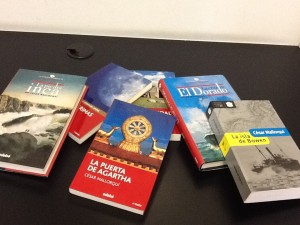
Y asimismo nuestro agradecimiento y el de nuestros lectores a las principales editoriales que publican la obra de César Mallorquí, Ediciones SM y Grupo Edebé por sus generosas donaciones a la biblioteca Jorge Luis Borges del ICNY con motivo de esta actividad.
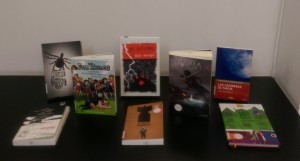
On June 13th we celebrated the XXIII Symposium on Children’s and Young Adult Literature at the Instituto Cervantes New York. Our guest of honor was the writer César Mallorquí, recipient of the National Youth Literature Prize for La isla de Bowen, who delighted us with two lectures titled In Praise of bad literature and In the mind of writing. The event was filled to capacity, and all our attendees came away with great lessons. We also enjoyed the presence of ICNY Spanish teacher Enrique Garcia, who gave a lecture on online tools offered by the IC for teachers and students of Spanish.
Once again we wish to thank the institutions that make it possible to hold this event every year: The Education Attaché from the Consulate of Spain in NY; the Office of Bilingual Education and Foreign Language Studies. New York State Department of Education; Office of English Language Learners and the New York City Department of Education.
We also extend our thanks to the major publishers of César Mallorquí’s works; Ediciones SM and Grupo Edebé for their generous donations to the ICNY Jorge Luis Borges Library on the occasion of this activity.
Editorial Anagrama en la biblioteca electrónica del Instituto Cervantes / Anagrama books are now part of the Instituto Cervantes Electronic Library

Nuevas noticias publicadas en la página de Facebook de la RBIC:
La colección de libros en formato digital de autores españoles e hispanoamericanos de la Editorial Anagrama ha sido incorporada a nuestra biblioteca electrónica. Consulta las novedades en nuestra plataforma http://ow.ly/zgKcR
Más información sobre la membresía y la descarga de libros electrónicos en http://nyork.cervantes.es/en/library_spanish/e_books.htm
Exciting news was just posted on the RBIC Facebook page:
A collection of e-books from Latin American and Spanish authors has been added to our electronic library collection. Check out these new arrivals on our e-book platform. http://ow.ly/zgKcR
For more information about membership and how to download e-books pleas pay a visit to our web page.
Actividad mágica con Christian Miró en la BEA 2014. Presentado por el Instituto Cervantes de Nueva York, ICEX y Páginas Libros de Magia / A magical event with Christian Miró at BEA 2014. Presented by Instituto Cervantes New York, ICEX and Páginas Libros de Magia

Un año más estuvimos presentes en Book Expo America (BEA 2014) y queremos agradecer al ICEX su organización y a todas las editoriales del pabellón de España sus donaciones a la biblioteca Jorge Luis Borges del Instituto Cervantes de Nueva York.
Nuestro reconocimiento y el de nuestros lectores a Ediciones Encuentro, Editorial Everest, Hispania Libros- Ciudad Argentina, LID, Gemser publications, Editorial Oceano, Edelvives, Cuento de luz, Cambel Editorial, Grupo Anaya, Páginas Libros de Magia, y a Odilo TID.
El ICNY y el ICEX organizaron una actividad mágica con la colaboración de la editorial Páginas Libros de Magia que con el mago Christian Miro nos enseñó que la magia , los trucos y las ilusiones pueden aprenderse en los libros.
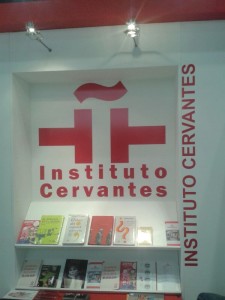
For yet another year we were present at Book Expo America (BEA 2014) and we would like to thank ICEX for organizing our presence at the event and all of the publishers in the Spanish pavilion for their generous donations to the Jorge Luis Borges Library at Instituto Cervantes New York
Our utmost gratitude goes out to Ediciones Encuentro, Editorial Everest, Hispania Libros- Ciudad Argentina, LID, Gemser publications, Editorial Oceano, Edelvives, Cuento de luz, Cambel Editorial, Grupo Anaya, Páginas Libros de Magia, and Odilo TID.
ICNY and ICEX organized a magical event with the help of the publisher Páginas Libros de Magia with the magician Christian Miró. His magic and mentalism show was entertaining and showed off many of the tricks and illusions present in their publications.
Donación de la Fundación Miguel Delibes, Amparo Medina-Bocos, y la Cátedra Miguel Delibes de la Universidad de Valladolid / Donation from the Miguel Delibes Foundation, Amparo Medina-Bocos, and the Miguel Delibes Chair at the University of Valladolid
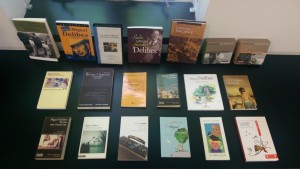
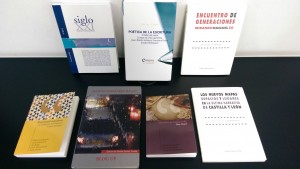
La biblioteca Jorge Luis Borges desea agradecer la generosa donación que han realizado recientemente la Fundación Miguel Delibes, la profesora Amparo Medina- Bocos, y la Cátedra Miguel Delibes de la Universidad de Valladolid. Los títulos han sido entregados con motivo de la presentación en el ICNY el pasado 9 de mayo de la correpondencia entre Gonzalo Sobejano y Miguel Delibes.
The Jorge Luis Borges Library would like to extend its utmost gratitude for the generous donation of books from the Miguel Delibes Foundation, the author Amparo Medina-Bocos, and the Miguel Delibes Chair at the University of Valladolid. The items were donated as a part of a cultural event that took place at Instituto Cervantes on May 9th 2014 about the correspondence between Gonzalo Sobejano and Miguel Delibes.
Dichos españoles y sus equivalentes en inglés / Spanish idioms and their English equivalents
Como todos los idiomas, el español acumula muchas frases hechas y refranes que sirven de reflejo de las ideas y la filosofía popular de los españoles. El refranero español es uno de los más completos que se conocen en el mundo, con casi 100.000 refranes registrados. Pero además las frases hechas y los refranes son un recurso muy útil para los estudiantes de español ya que el uso de refranes es una parte consustancial de la forma de hablar habitual de los hispanohablantes.
Para abrir boca aquí os presentamos algunos de los refranes españoles más utilizados, su traducción literal y su equivalente en inglés:
Like every language does, Spanish accumulates many idioms that reflect the Spanish popular way of thinking. “El refranero español” (The Spanish book of proverbs) is one of the most complete in the world, with nearly 100,000 registered idioms and proverbs. But also, they are very useful for students of Spanish because they are an essential part of the popular and informal way of speaking.
Here you have a short list with some of the most used and useful Spanish proverbs and idioms, their literal translations and their equivalent in English:
Del dicho al hecho hay un trecho.
Literal translation: From the spoken words to the facts there is a long way.
English equivalent: Easier said than done a stretch.
A buen entendedor, pocas palabras bastan.
Literal translation: To the good listener, few words are enough.
English equivalent: A word is enough to the wise.
Más vale pájaro en mano que ciento volando.
Literal translation: A bird in the hand is worth hundred flying.
English equivalent: A bird in the hand is worth two in the bush.
Cuando hay hambre, no hay pan duro.
Literal translation: When you are hungry, there is no hard bread.
English equivalent: Beggars can’t be choosers.
Dios los cría y ellos se juntan.
Literal translation: God raises them and they get together.
English equivalent: Birds of a feather flock together.
No vendas la piel del oso antes de cazarlo.
Literal translation: Don’t sell the bear’s skin before you get to hunt it.
English equivalent: Don’t count your chickens before they are hatched.
No te lo juegues todo a una sola carta.
Literal translation: Don’t bet all to one card.
English translation: Don’t put all your eggs in one basket.
Hecha la ley, hecha la trampa.
Literal translation: Done the law, done the trick.
English equivalent: Every law has its loophole.
Por un perro que maté, mataperros me llamaron
Literal translation: I killed a dog and now they call me dog killer.
English equivalent: Give a dog a bad name and hang it.
Dios aprieta pero no ahoga.
Literal translation: God squeezes but does not choke.
English equivalent: God tempers the wind to the shorn lamb.
Vísteme despacio que tengo prisa.
Literal translation: Dress me slowly that I’m in a hurry.
English equivalent: More haste, less speed.
Lo cortés no quita lo valiente.
Literal translation: Politeness doesn’t override bravery.
English equivalent: Politeness costs nothing.
En casa del herrero, cuchillo de palo.
Literal translation: In the Blacksmith’s home they use a wooden knife.
English equivalent: The shoemaker’s son always goes barefoot.
Cuando el río suena, agua lleva.
Literal translation: When you hear the river it’s because it carries water.
English equivalent: Where there’s smoke, there’s fire.
Debido a su gran importancia, pero también porque se trata de una parte del español que combina cultura y lengua de forma tan interesante como entretenida, el Instituto Cervantes de Nueva York ofrece a partir del 21 de junio un curso especializado para que los estudiantes se familiaricen con algunos de los refranes más comunes del español y sepan identificar las mejores ocasiones para utilizarlos.
Because of its great importance, but also because it is a part of the Spanish culture that combines entertainment and language, Instituto Cervantes New York offers a specialized course to familiarize students with some of the most commonly used Spanish idioms and proverbs.
